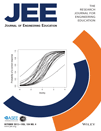
JOURNAL OF ENGINEERING EDUCATION
Scope & Guideline
Elevating Academic Discourse in Engineering Training
Introduction
Aims and Scopes
- Pedagogical Innovations:
The journal emphasizes research on innovative teaching methods and practices in engineering education, exploring how different pedagogical approaches can enhance student learning outcomes and engagement. - Student Experiences and Perspectives:
A significant focus is placed on understanding the experiences and perspectives of engineering students, including their learning processes, challenges, and development of professional identities. - Curriculum Development:
The journal discusses various aspects of curriculum design and implementation, particularly in relation to integrating emerging technologies, interdisciplinary learning, and real-world applications. - Ethics and Social Responsibility in Engineering:
Research on the ethical dimensions of engineering education, including the incorporation of social responsibility and sustainability principles, is a core area of interest. - Assessment and Evaluation Methods:
The journal investigates diverse assessment strategies and their effectiveness in measuring student learning and competency development in engineering education. - Diversity and Inclusion in Engineering:
The journal addresses themes of diversity, equity, and inclusion within engineering education, examining barriers and supports for underrepresented groups.
Trending and Emerging
- Integrating Technology in Education:
There is a growing emphasis on the use of technology, including virtual labs, online learning environments, and gamification, to enhance student engagement and learning outcomes. - Interdisciplinary Learning and Collaboration:
Research highlighting interdisciplinary approaches in engineering education is on the rise, focusing on collaboration across various fields to solve complex engineering challenges. - Focus on Mental Health and Well-being:
Increasing attention is being given to the mental health and well-being of engineering students, reflecting a broader concern for student support systems and resilience. - Competencies for Sustainable Development:
Emerging themes explore the competencies required for sustainable engineering practices, aligning education with global sustainability goals and the demands of industry. - Active Learning Strategies:
There is a notable trend towards active learning methodologies, with a focus on student-centered approaches that promote engagement, collaboration, and critical thinking. - Ethical and Social Responsibility Education:
Research on embedding ethics and social responsibility within engineering curricula is gaining traction, emphasizing the role of engineers in addressing societal challenges.
Declining or Waning
- Traditional Lecture-Based Teaching:
There has been a noticeable decline in research focusing on traditional lecture-based teaching methods, as the field increasingly values active learning and student-centered approaches. - Narrowly Defined Technical Skills:
Research emphasizing solely technical skills without considering broader competencies such as teamwork, communication, and ethics appears to be waning as the need for holistic engineering education becomes more recognized. - Static Curriculum Models:
The discussion around rigid, static curriculum models is decreasing, with more emphasis being placed on agile and flexible curriculum structures that can adapt to industry needs and technological advancements. - Uniform Assessment Practices:
There is less focus on uniform assessment practices that do not account for diverse student needs and learning styles, as the journal increasingly promotes differentiated and formative assessment strategies. - Internationalization of Engineering Education:
While still relevant, the specific theme of internationalization in engineering education is less frequently addressed, possibly due to a broader integration of global perspectives across various topics.
Similar Journals
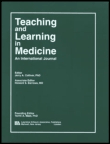
TEACHING AND LEARNING IN MEDICINE
Transforming healthcare training with cutting-edge insights.TEACHING AND LEARNING IN MEDICINE is a distinguished academic journal, published by Routledge Journals, Taylor & Francis Ltd, focusing on the critical intersection of education and medical training. Since its inception in 1989, this journal has become a vital resource for researchers, practitioners, and educators, showcasing cutting-edge research and innovative practices that enhance pedagogical approaches in medicine. With an impact factor reflective of its high influence in the field, it has earned a notable Q1 ranking in both the Education and Miscellaneous Medicine categories for 2023. Additionally, its impressive Scopus rankings highlight its significance within the medical and educational research communities. Although not an open access journal, TEACHING AND LEARNING IN MEDICINE provides valuable insights that contribute to the advancement of medical education and the improvement of learning outcomes, ensuring that readers stay at the forefront of pedagogical developments. With a commitment to scholarly rigor and practical relevance, this journal is an essential reading for anyone dedicated to elevating educational standards in the healthcare profession.

TEACHING SOCIOLOGY
Advancing Teaching Excellence in Social Science.TEACHING SOCIOLOGY is a distinguished journal published by SAGE PUBLICATIONS INC, focusing on the pedagogical aspects of sociology and its related fields. With an ISSN of 0092-055X and an E-ISSN of 1939-862X, this journal caters to academics looking to enhance the teaching and learning experiences within sociology education. As evidenced by its impressive Q1 and Q2 rankings in Sociology and Political Science and Education, respectively, TEACHING SOCIOLOGY holds a notable position in the academic landscape, ranking in the top percentiles among its peers. This journal is particularly valuable for educators, researchers, and practitioners seeking to contribute to the advancement of teaching methodologies within the social sciences. Featuring a wide range of articles aimed at fostering innovative teaching strategies and scholarly discourse, TEACHING SOCIOLOGY is an essential resource for anyone dedicated to the cultivation of informed sociological inquiry. With its historical significance established since its inception in the late 1980s, the journal continues to impact contemporary educational practices in an ever-evolving academic environment.
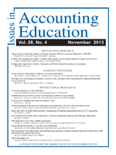
ISSUES IN ACCOUNTING EDUCATION
Exploring New Frontiers in Accounting TeachingISSUES IN ACCOUNTING EDUCATION is a leading academic journal published by the American Accounting Association, dedicated to advancing the field of accounting education through innovative research and practical applications. With an ISSN of 0739-3172 and an E-ISSN of 1558-7983, this journal has established itself as a key resource for accounting educators, researchers, and practitioners alike. Ranked in the Q2 category for Education and Q3 for Accounting in 2023, it plays a critical role in disseminating knowledge that enhances pedagogical practices and curriculum development across the globe. The journal is recognized for its robust contributions to the Social Sciences and Business Management fields, with Scopus rankings placing it in the 58th and 42nd percentiles, respectively. Although it does not offer open access, the journal is committed to fostering scholarly dialogue and contributing to the continuous development of accounting education from 2009 to 2024. Researchers, educators, and students will find invaluable insights and findings that not only shape academic discourse but also inform best practices in the classroom.
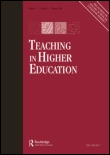
TEACHING IN HIGHER EDUCATION
Empowering educators through innovative teaching insights.TEACHING IN HIGHER EDUCATION is a premier academic journal published by Routledge Journals, Taylor & Francis Ltd, dedicated to advancing the scholarship and practice of teaching within the higher education sector. With an ISSN of 1356-2517 and an E-ISSN of 1470-1294, this journal is widely recognized for its profound impact in the field, boasting a 2023 category rank of Q1 in Education, placing it in the top tier of educational research. Its commitment to fostering an inclusive and dynamic discourse on pedagogical methods and learning frameworks makes it essential reading for researchers, educators, and policymakers alike. Spanning topics such as student engagement, curriculum development, and innovative teaching strategies, TEACHING IN HIGHER EDUCATION aims to contribute to ongoing conversations and practical applications that enhance the educational landscape. While an Open Access option is not available, the journal maintains a robust readership, with its articles being rigorously peer-reviewed and disseminated to reflect cutting-edge research trends and practices in education.
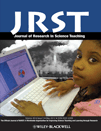
JOURNAL OF RESEARCH IN SCIENCE TEACHING
Transforming Teaching Through Rigorous ResearchJOURNAL OF RESEARCH IN SCIENCE TEACHING, published by WILEY, is at the forefront of educational research, specifically focusing on the dynamic field of science education. With an impressive Q1 ranking in the education category for 2023 and a percentile of 95th among its peers in Scopus, this journal serves as a critical resource for researchers, educators, and policymakers dedicated to improving teaching and learning practices in science. Established in 1963 and consistently published through 2024, the journal caters to a diverse audience by disseminating rigorous, peer-reviewed research that informs instructional strategies, curriculum development, and assessment techniques. Although it does not currently offer open access, the journal remains a prestigious platform for impactful scholarship in science education, located in Hoboken, NJ. Researchers and professionals alike will find here not only valuable insights but also innovative approaches that are essential to advancing science education in the 21st century.
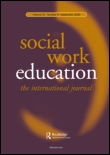
SOCIAL WORK EDUCATION
Exploring New Frontiers in Social Work ScholarshipSOCIAL WORK EDUCATION, published by Routledge Journals, Taylor & Francis Ltd, is a premier academic journal that has been at the forefront of exploring the crucial intersection of social work and education since its inception in 1981. With an impressive impact factor and ranked in the Q1 quartile for both Education and miscellaneous Social Sciences, this journal provides a platform for cutting-edge research and discourse aimed at advancing professional education in social work. It appeals to a diverse audience of researchers, practitioners, and students committed to enhancing the efficacy of social work practices through empirical studies and theoretical insights. Housed in the United Kingdom, SOCIAL WORK EDUCATION not only disseminates critical findings but also fosters a global dialogue about innovative educational methods and practices that respond to the evolving challenges within the field. Access options may vary, yet the journal remains a vital resource for those dedicated to the development and improvement of social work education.

International Electronic Journal of Mathematics Education
Fostering Global Collaboration in Mathematics EducationInternational Electronic Journal of Mathematics Education (IEJME) is a premier platform dedicated to advancing the field of mathematics education through rigorous research and innovation. Published by MODESTUM LTD, this interdisciplinary journal focuses on the pedagogical, theoretical, and empirical aspects of mathematics education, facilitating a deep understanding of teaching practices, learning methods, and curriculum development. With its commitment to open access, IEJME ensures that research findings are accessible to a global audience, fostering collaborative efforts among educators, researchers, and practitioners. The journal has maintained a commendable position in academic rankings, holding a Rank of #114/399 in General Mathematics and #782/1543 in Education within Scopus, highlighting its significant contribution to the scholarly community. By publishing high-quality research from 2009 to 2016 and 2021 to 2024, IEJME continues to serve as an essential resource for those invested in enhancing mathematical understanding in educational contexts, inspiring future generations of mathematicians and educators.
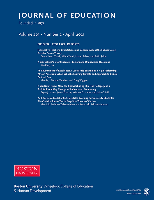
Journal of Education-US
Innovating the future of education with critical insights.Journal of Education-US, published by SAGE Publications Inc, is an esteemed academic journal dedicated to advancing the field of education through rigorous research, theoretical discourse, and diverse methodologies. With both print (ISSN: 0022-0574) and digital (E-ISSN: 2515-5741) formats available, this journal serves as a vital resource for educators, researchers, and policy-makers alike. The journal is classified in the Q2 quartile for Arts and Humanities and Q3 for Education as of 2023, reflecting its influence within the academic community. It holds a respectable rank of #908 out of 1543 in the Scopus database within the Social Sciences Education category, indicating its relevance and contribution to ongoing debates and innovations in educational practices and theories. While not currently an open-access journal, its carefully curated articles provide valuable insights and foster critical discussions that drive the education sector forward. With a publication span from 2005 and ongoing, the Journal of Education-US remains a cornerstone for impactful scholarship in education.
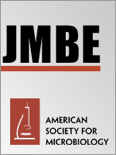
Journal of Microbiology & Biology Education
Fostering Innovation in Biological Sciences EducationJournal of Microbiology & Biology Education, published by the American Society for Microbiology, serves as a vital platform for advancing knowledge and education in microbiology and related biological fields. With an ISSN of 1935-7877 and an E-ISSN of 1935-7885, this open-access journal has been fostering scholarly communication since 2000, ensuring that vital research is accessible to a global audience. The journal covers a broad scope within the disciplines of Agricultural and Biological Sciences, Biochemistry, Genetics, Molecular Biology, and Educational methodologies, holding a significant position as reflected by its Q2 quartile rankings in multiple fields for 2023. The Scopus ranking highlights its relevance, ranking it in the 64th percentile in general Agricultural and Biological Sciences and Education, and 48th in Immunology and Microbiology. Positioned in the United States, the journal addresses the imperative need for educational resources and research dissemination in the ever-evolving landscape of microbiological sciences. Researchers, professionals, and students will find invaluable insights and pedagogical innovations within its pages, advancing both academic inquiry and educational practice.

Cadmo
Illuminating Contemporary Issues through a Cultural LensCadmo is a prominent academic journal published by FRANCO ANGELI, specializing in the fields of Cultural Studies, Education, and History. With a long-standing commitment to advancing knowledge from its inception in 2005, the journal has established itself within the academic community, featuring a diverse range of scholarly articles that engage with contemporary issues through a cultural lens. Although it operates without an open access model, Cadmo maintains a solid reputation, positioned in 2023 within the Q3 and Q4 quartiles in various categories, reflecting its ongoing contribution to rich disciplinary dialogues. The journal's rigorous peer-review process ensures high-quality research dissemination, inviting submissions that contribute to theoretical, empirical, and methodological advancements. Researchers, professionals, and students alike will find Cadmo an invaluable resource for insights and developments within its interdisciplinary domains.